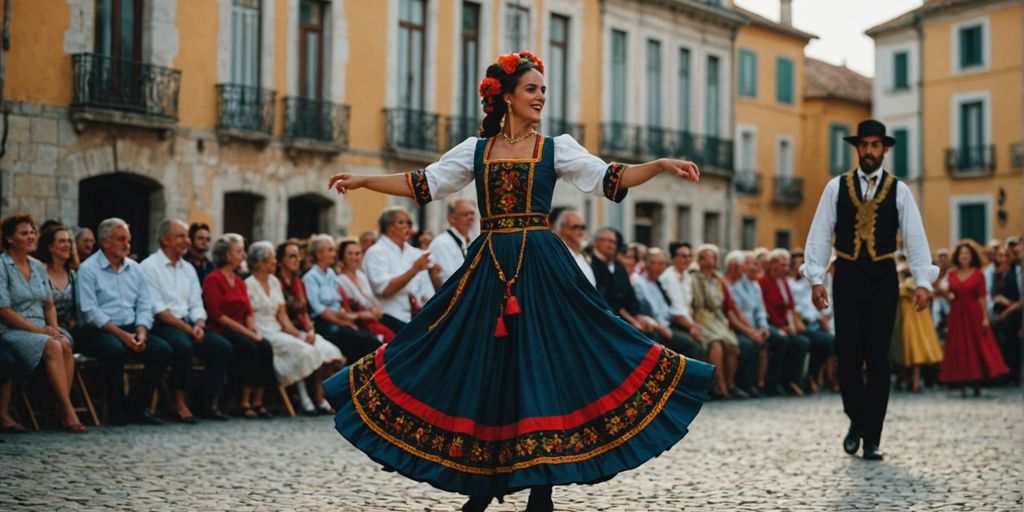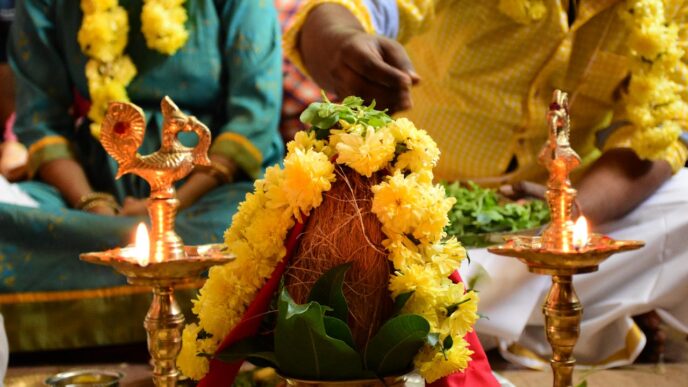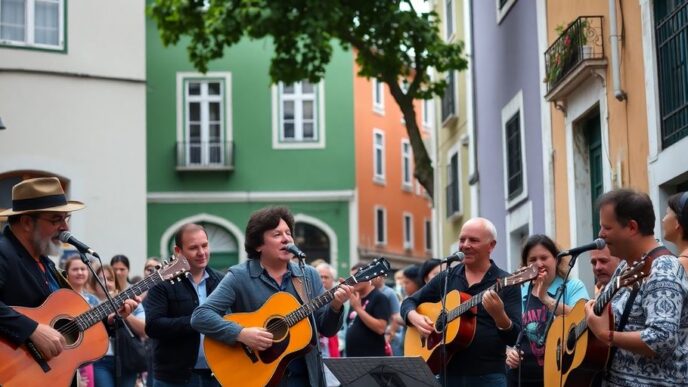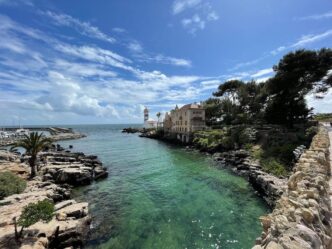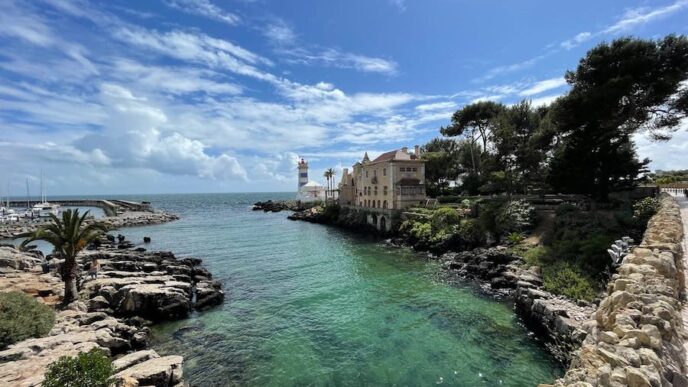The Warmth of Portuguese Hospitality
Hospitality is a hallmark of Portuguese culture. The Portuguese are known for their genuine pride in their heritage and their eagerness to share it with others. Visitors often feel the warmth and generosity of the locals, reflecting Portugal’s long tradition of openness and friendship.
Sharing Meals and Stories
In Portugal, sharing meals is more than just eating. It’s about connecting with others. When you sit down for a meal, you’re not just tasting food; you’re experiencing a piece of Portuguese life. Simple pleasures, like enjoying a pastel de nata in a local café, can become moments of pure delight. The Portuguese love to share stories, making every meal a memorable experience.
The Art of Welcoming Guests
The Portuguese take pride in making guests feel at home. Their welcoming nature stands out, making visitors feel like part of the family. Whether you’re visiting a local’s home or staying at a hotel, you’ll notice the effort they put into making you comfortable. This tradition of hospitality is deeply rooted in their culture, offering a glimpse into a society where relationships are cherished and connections are prioritized over punctuality.
Portuguese Cuisine: A Flavorful Journey
Portuguese cuisine is a delightful mix of Mediterranean flavors and Atlantic ingredients. It features a rich variety of dishes that excite the senses. With a focus on fish, meat, olive oil, tomatoes, and spices, Portuguese culinary traditions are all about quality ingredients and simple cooking methods. Hearty soups, homemade bread, cheeses, and unique combinations of meat and shellfish make this food scene lively and diverse.
Traditional Dishes You Must Try
At the heart of Portuguese cuisine is a love for keeping the true flavors of its ingredients. Whether it’s the famous bacalhau dishes made from dried and salted cod or the delicious porco preto ham, each dish honors the country’s culinary heritage with passion and pride. From busy diners, where family rituals of dining unfold over traditional meals, to quaint bakeries serving freshly baked bread and pastries, Portugal offers a culinary experience that is both authentic and unforgettable.
The Role of Seafood in Portuguese Cooking
Seafood is a big part of Portuguese cuisine. Traditional dishes like ‘bacalhau’ (cod) and ‘sardinhas assadas’ (grilled sardines) are central to the dining experience. The abundance of fresh seafood invites diners on a tour of taste and tradition, where every bite tells a story of centuries-old culinary craftsmanship. Appreciating local food is more than just eating; it’s a cultural experience that connects people to the heart of Portuguese lifestyle.
Sweet Treats and Desserts
Portuguese desserts are a must-try. The famous ‘pastéis de nata’ (custard tarts) are a sweet delight that you can’t miss. These treats, along with other pastries and sweets, are often enjoyed with a cup of coffee. The combination of flavors and textures in Portuguese desserts can transport your senses straight to the charming streets of Portugal.
Fado: The Soulful Music of Portugal
Fado is the soulful heartbeat of Portugal. This traditional music genre expresses deep emotions like love, loss, and nostalgia. Originating in the Alfama neighborhood of Lisbon, Fado dates back to the 19th century. It began as a way for urban working-class people to share their stories and struggles.
Origins of Fado
Fado started in Lisbon’s Alfama neighborhood. It was a form of expression for the working class. They poured their emotions into its mournful tunes.
Famous Fado Singers
Some of the most famous Fado singers include Amália Rodrigues and Mariza. Their voices capture the essence of Fado’s emotional depth.
Experiencing Fado in Lisbon
To truly experience Fado, visit a Fado house in Lisbon. The intimate setting and soulful music create a unique and unforgettable experience.
Portuguese Festivals and Celebrations
Portugal is famous for its lively festivals and celebrations. These events are a big part of the country’s culture and traditions. From religious ceremonies to seasonal harvests, there’s always something to celebrate.
The Influence of History on Portuguese Culture
Understanding the evolution of Portuguese culture is important. It helps us see the country’s rich history and the influences that have shaped its identity. From the Moorish occupation to the Age of Discoveries, Portugal’s cultural heritage has been shaped by various events and influences. By studying Portuguese culture, we can gain insight into the country’s values, traditions, and beliefs, as well as its contributions to the world. It also helps us appreciate the diversity and richness of Portuguese culture.
Portuguese Art and Architecture
Portugal’s art and architecture are a blend of old and new. The country’s buildings show influences from many cultures and styles. You can see Romanesque, Gothic, Manueline, and Baroque designs in many places. Modern buildings mix tradition with new ideas, creating bold and innovative designs.
Manueline Style
The Manueline style is unique to Portugal. It features intricate decorations and religious symbols. You can find this style in famous landmarks like the Jeronimos Monastery and the Belem Tower.
Azulejos: The Art of Ceramic Tiles
Azulejos are colorful ceramic tiles that decorate many buildings in Portugal. These tiles often tell stories or show beautiful patterns. They are a big part of Portugal’s artistic culture.
Contemporary Art Scene
Today’s Portuguese artists work in many different media. Their art reflects the country’s vibrant and diverse culture. From paintings to sculptures, contemporary art in Portugal is always evolving.
The Portuguese Language: More Than Just Words
Learning Portuguese is key to unlocking the full richness of life in Portugal. It helps with daily interactions and deepens your understanding of the culture. Mastering the language allows for a more meaningful experience.
Portugal’s diverse culture is reflected in its language. Regional dialects showcase the country’s rich geography and history. From the distinct accents of the North to the softer tones of the Algarve, each region adds its unique essence to the language.
Portuguese literature is a treasure trove of stories and poems. It offers a glimpse into the country’s soul. From classic works to modern tales, there’s something for everyone to enjoy.
Traditional Portuguese Handicrafts
Portugal’s handicrafts are a window into its rich culture. They show off the country’s creativity and heritage. From colorful embroidery to unique pottery, these crafts are truly special.
Embroidery and Lace
Portuguese embroidery is famous for its detailed and colorful designs. Madeira and Guimarães are well-known styles. Lace-making is also a cherished tradition, with intricate patterns passed down through generations.
Ceramics and Pottery
Pottery in Portugal has a long history. Famous styles include Bordallo Pinheiro and Alcobaça ceramics. These pieces are both beautiful and useful. They make great souvenirs.
Cork Products
Portugal is the world’s top cork producer. Cork is used to make many items, from bags to shoes. It’s eco-friendly and stylish. Cork products are a must-buy when visiting Portugal.
The Portuguese Way of Life
The Portuguese lifestyle is all about balance. People here know how to enjoy life while managing their responsibilities. It’s a mix of work, family, and leisure that makes life fulfilling.
Daily Rituals and Customs
In Portugal, daily life is filled with simple pleasures. From sipping coffee at a local café to taking a leisurely stroll in the evening, these small moments are cherished. The pace of life is relaxed, allowing people to truly enjoy each day.
The Importance of Family
Family is at the heart of Portuguese culture. Weekends often mean large family gatherings, filled with laughter and good food. It’s common for multiple generations to live close to each other, maintaining strong family ties.
Balancing Work and Leisure
Work-life balance is a priority in Portugal. People work hard, but they also make time for relaxation and fun. Whether it’s a long lunch break or a weekend getaway, leisure time is valued. This balance contributes to a high quality of life.
Exploring Portugal’s Natural Beauty
Portugal’s landscapes are incredibly diverse. From rugged mountains to serene plains, there’s something for everyone. The coastline stretches over 800 kilometers, offering stunning beaches and dramatic cliffs. Each region has its own unique charm and lifestyle.
Beaches and Coastal Areas
Portugal’s coastline is a paradise for beach lovers. You can find everything from bustling tourist spots to hidden gems. The Algarve is famous for its golden sands and clear waters. Surfing enthusiasts flock to the beaches for some of the best waves in Europe.
National Parks and Reserves
Portugal is home to several national parks and reserves. These areas protect the country’s natural beauty and wildlife. Peneda-Gerês National Park is a must-visit. It offers breathtaking views and a chance to see rare animals. The Douro Valley is another highlight, known for its rolling vineyards and scenic landscapes.
Hiking and Outdoor Activities
Hiking in Portugal is a treat for nature lovers. The country has many trails that cater to all levels. From the rugged cliffs of the Algarve to the serene paths in Serra da Estrela, there’s a trail for everyone. Outdoor activities like kayaking and bird-watching are also popular.
Portuguese Wine Culture
Portugal is famous for its wine. Each region produces a variety of high-quality wines. From the world-renowned Alentejo and Douro Valley to the Lisbon area, there’s something for everyone.
Famous Wine Regions
Portugal has many famous wine regions. The Douro Valley is known for its port wine. Alentejo offers rich, full-bodied reds. The Lisbon area also has a broad range of wines.
Wine Tasting Experiences
Wine tasting in Portugal is a must. Visit local vineyards and enjoy guided tours. Learn about the winemaking process and sample different wines.
The Tradition of Port Wine
Port wine is a big part of Portuguese culture. It’s a sweet, fortified wine from the Douro Valley. Enjoy it as a dessert wine or with cheese.
Frequently Asked Questions
What makes Portuguese hospitality unique?
Portuguese hospitality is known for its warmth and generosity. People often invite others to share meals and stories, making guests feel like part of the family.
What are some must-try traditional Portuguese dishes?
You should definitely try bacalhau (salted cod), caldo verde (green soup), and pastéis de nata (custard tarts). These dishes are staples in Portuguese cuisine.
How important is seafood in Portuguese cooking?
Seafood is very important in Portuguese cooking. The country has a long coastline, so fresh fish and shellfish are common ingredients in many dishes.
What is Fado music?
Fado is a traditional Portuguese music genre that is very emotional and soulful. It often tells stories of love, loss, and longing.
When are some major Portuguese festivals?
Some major festivals in Portugal include Carnival, Saint Anthony’s Day, and the Feast of Saint John. These celebrations are full of music, dance, and traditional foods.
How has history influenced Portuguese culture?
Portuguese culture has been shaped by various historical periods, including Roman and Moorish rule, the Age of Discoveries, and modern times. Each era has left its mark on the country’s traditions and values.
What are Azulejos?
Azulejos are ceramic tiles that are often used to decorate buildings in Portugal. They come in various colors and patterns and are an important part of Portuguese art and architecture.
What is the significance of Port wine in Portugal?
Port wine is a famous Portuguese wine that is often enjoyed as a dessert wine. It is produced in the Douro Valley and has a rich history dating back centuries.

